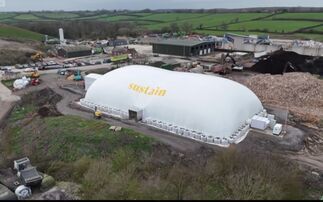UK's top clean tech investors and entrepreneurs last week discussed the future of clean tech innovation at the first virtual edition of BusinessGreen Technology and Investment Forum, hosted in association with InnovateUK
The pandemic may have inevitably taken a harder toll on smaller, early stage companies than more established firms, but the economic crisis still provides an opportunity for the green start-up community to highlight the critical role it is set to play in a rapidly-changing world.
That was the overriding message delivered by some of the UK's top clean technology investors during last week's BusinessGreen Technology and Investment Forum, which saw 11 of the country's most promising green technology start-ups pitch their business ideas as part of a virtual forum.
From the challenges that surround the commercialisation of hydrogen and carbon capture technologies to the decarbonisation of the UK's leaky building stock, this year's summit underscored that there are no shortage of problems ripe for upstart clean technology businesses to solve over the coming decade as the UK speeds towards its newly-announced target of achieving an emissions reduction target of 68 per cent against 1990 levels.
"The next 10 years will be defining for clean growth and meeting our net zero targets," Beverley Gower-Jones, managing partner at the Clean Growth Fund, reflected during the event's opening panel discussion. "So in terms of the scale of the opportunity, its enormous, its huge."
Gower-Jones singled out the development of hydrogen, the acceleration in demand for nature-based solutions, the need for industrial fuel switching, and improved business energy efficiency as areas begging out for new technology solutions and ripe for investment in the wake of the positive market signals delivered by the government's 10 Point Plan for a Green Industrial Revolution. "We closed the Clean Growth Fund during Covid," she said. "And so we are actively looking across some of those sectors for the most promising companies to invest in. It's a really exciting time."
The broadly positive sentiment was echoed by fellow panellist Andrew Wordsworth, a managing partner at Sustainable Ventures, who noted that after more than a "decade in the wilderness", corporates, investors, and the government were finally rallying behind sustainable investment. Following an undeniably tough spring and summer, "it feels overall there's a positive sentiment, buoyed by the markets coming back and getting a little bit richer," he reflected. "Certainly we've seen more activity with angels."
Francis Wright, director of Turquoise International, similarly reflected that the pandemic had turbocharged investors appreciation for sustainable ventures. With more people working and cooking from home over the months of lockdown, the coronavirus had accelerated public and investor understanding of the need for household energy efficiency improvement and sustainable food systems, he noted. "This whole time [Covid] has accelerated some of the themes that were happening anyway, but I think it's become much more stark," he said. "While it's still very difficult for a lot of companies, the focus on sustainability and on solving some of the problems we have in the world, I think, are now being taken much more seriously."
But there is no doubt that the past 10 months have been tough for SMEs and start-ups, who inevitably face tougher economic headwinds than larger companies during a recession and can suffer the brunt of tightened public and investor purse strings as funding is diverted into the coronavirus response and lower risk assets.
But Ian Meikle, director of clean growth and infrastructure at Innovate UK, emphasised that despite the downturn there was no shortage of innovative clean technology businesses ideas that were continuing to advance, with 4,000 companies funded by the government's innovation agency this year, out of a pool of applications "three of four times" as large.
The government's decision to limit the Spending Review to one year may have injected a degree of uncertainty into future R&D funding settlements, but Meikle remained upbeat at the prospects of continued government support for a sector that is now regarded as strategically crucial to the government's green goals. "We are seeing good responses and people develop new types of products," he said. "And I think clearly, the government clearly wanted to do something about clean growth [in the Spending Review], but maybe that tension and frustration that that they really wanted to, really helps us come to a turning point. So its been undoubtedly tough for small businesses this year but hopefully the tail winds are there."
The upcoming COP26 Climate Summit, set to be hosted by the UK in Glasgow next November, and the UK's upcoming presidency of the G7 and G20 present major opportunities to build further momentum across the sector and showcase British climate innovation, he emphasised, noting that Innovate UK was planning a series of innovator-investor events over the course of the next year.
"COP26 is a great opportunity to showcase, and we're putting together companies that can support there," he said. "But unless we get into the financial markets - which is where the G7 and the G20 come in - and really think about how we can transform our economy - those elements need to come together. So I think there is some optimism, there's great opportunities for UK companies to showcase."
Last week's webinar proved that there are no shortage of visionary ideas being cooked up by UK entrepreneurs eager to take advantage of investor and government support. For example, David Yates of Bumblebee Wireless explained how the firm's technology is aiming to halve the cost of ride sharing by providing wireless charging technology to e-mobility vehicles, while Toby Gill set out how flameless ceramic turbines developed by Intelligent Power Generation are aiming to provide companies with flameless, pollution-free combustion of all renewable fuel types.
Meanwhile, Victor Dewulf of RecycleEYE explained how his start-up's technology relies on machine learning and algorithms to mimic human vision and identify items in waste streams typically missed by current recycling processes, and Glenn Hunt-Whitfield described how Seamach Energy's innovative wind turbine design promises to deliver a major step change in turbine output and efficiency, and thus allow developers to build wind farms with significantly lower infrastructure costs.
And Dan White presented Signol, a smart software platform that prompts employees to make decisions that carry a less heavy environmental toll, by leveraging cutting-edge behavioural science and analytics. Already deployed in the aviation sector to encourage staff to take decisions that reduce fuel use of flights, the company is hoping to expand into the road transportation and shipping markets in the near future.
Despite the "huge opportunity" for start-ups over the coming decades as momentum towards net zero picks up, the Clean Growth Fund's Gower-Jones counselled start-ups to stay focused on the key elements of building any successful business.
"It comes back to the fundamentals," she observed. "Do you have that product market fit? Are you really focused on that first early-adopter customer and and are you building those revenues? Have you identified the next key hire, and are you ready to bring that that person in? Governance: do you have the right non execs on the board, and are they really helping to make the right network connections to enable your business to take that next step? Ultimately its down to that focus on growing and running the business."
The global economy may have faced a period of unprecedented disruption and is on the cusp of decade of rapid technology-led transformation, but for entrpreneurs, innovators, and investors some things don't change.









